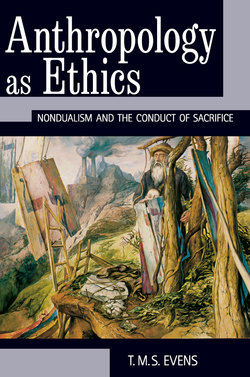Читать книгу Anthropology as Ethics - T. M. S. (Terry) Evens - Страница 10
На сайте Литреса книга снята с продажи.
ОглавлениеPART I
THE ETHNOGRAPHIC SELF
The Socio-political Pathology of Modernity
Part 1 argues that dualism constitutes the central principle on which reason qua reason ultimately depends, and that as a consequence reason of this received sort—the rationality peculiarly associated with the Enlightenment and invented by the ancient Greeks—disposes an exclusionism so final as to allow and even cultivate, when it informs political relations, the likes of the Holocaust. In order to bring into relief the phenomenological and existential bearing of this abstract thesis about rationality, I tie it to the conduct of sacrifice in general and Judeo-Christian mythic tradition in particular. Arguing that being human is fundamentally construable as a conduct of sacrifice, I describe the Holocaust as a ritualistic attempt to achieve a form of sacrifice prohibited by but gravitative in the sacrificial logic of Judeo-Christianity—namely, perfect sacrifice. Such a sacrifice is indistinguishable from counter-sacrifice, in that it constitutes an endeavor to establish a self-identity so closed and exclusive that further sacrifice to and on behalf of the other would be obviated. In as much as sacrifice, in my description, is a condition for being human, a defining component of the structural dynamic of human existence, perfect or final sacrifice must be, logically speaking, definitively inhuman (which, of course, only humans can be). It follows that any homicidal enterprise it promotes cannot but also be suicidal, and that the Judeo-Christian logic of sacrifice bears innately the seeds of its own destruction. Finally, in order to help clarify the character of my argument about rationality, I look appreciatively but also critically at the practical reason of both Bourdieu and Habermas. The object of these critiques is twofold: first, to clarify by contrast the difference made by rethinking ‘practice’ and ‘rationality’ with explicit reference to ontology, and, second, in line with the reflexive aim running throughout the earlier chapters, to bring out still more the extreme tenacity of dualism as a scaffolding of Western thought.
The Chapters
Chapter 1, the first of the six chapters in part 1, clarifies the critical importance of ontology for anthropology by looking closely at the Kantian notion of the ‘synthetic a priori’, as this notion is revised in the work of two major twentieth-century philosophers,
Wittgenstein and Maurice Merleau-Ponty. The chapter shows that the synthetic a priori amounts to an intellectually profound attempt to conceptualize ontological ambiguity or nondualism, and for this reason furnishes rich insight into the nature of culture and the peculiar character of human existence.
The next two chapters, 2 and 3, by showing how human existence per se can be described as the conduct of sacrifice, demonstrate the critical lived significance of the philosophical conceptual opposition between dualism and nondualism as well as the notion of ontological ambiguity. In chapter 2, I offer an intensive interpretation of the Akedah, the biblical story of Abraham's ‘binding’ (for sacrifice) of his beloved son Isaac. Contrasting the Akedah to Nuer sacrifice, and bouncing off Derrida's profound interpretation of Kierkegaard's reading, I argue that the story's logic of blind faith—not the only logic to the story, but the one on which Kierkegaard dwells—reveals, rather than a transcending and self-evident good, a dualistic and lethal principle of self-perfection. In chapter 3, the first of two excurses (both provoked by Derrida's piercing meditations), I contend that the Akedah's lesson of murderous abnegation offers a description of human life as essentially a sacrificial dynamic. In light of my argument about perfect sacrifice, chapter 4 takes up the case of the Holocaust. After analyzing the logical contribution of ‘rationalization’ to the realization of the Nazi death camps, I offer a phenomenological analysis of how something so abstract as rationality qua rationality could help to induce people to commit mass murder routinely, on an industrial scale. I find that the basic and most comprehensive self-identity fostered by Nazism pivots dualistically on a principle of self-perfection, making it especially receptive to a rationality defined in dualistic or absolute terms. In result, this existential, and hence ‘naturally’ impelling, self-identity inverts the vital purpose of sacrifice, constituting what I think of as a counter-sacrificial form and logic, whereby the object is simply—to the complete exclusion of abnegation or ‘giving’—the total obliteration of the other.
Chapters 5 and 6 examine two exceedingly powerful and progressive but nonetheless insufficient social theoretical attempts to remedy the dualism that conditions such lethal sacrificial conduct. In chapter 5, I take up Pierre Bourdieu's theory of practice. Through close analysis of certain critical elements of Bourdieu's sociology, I show that his remedial notion of practice is keyed to terms of power rather than ethics, and that as a consequence it fails to overcome dualistic representation. In chapter 6, I perform a similar exercise, only now with ‘rationality’, as this concept is importantly reconstructed by Jürgen Habermas. Habermas takes rationality well beyond considerations of power, yet I show that his treatment of mythological thought as simply closed suggests that his progressive concept of rationality remains still informed by the dualist and instrumentalist one.
